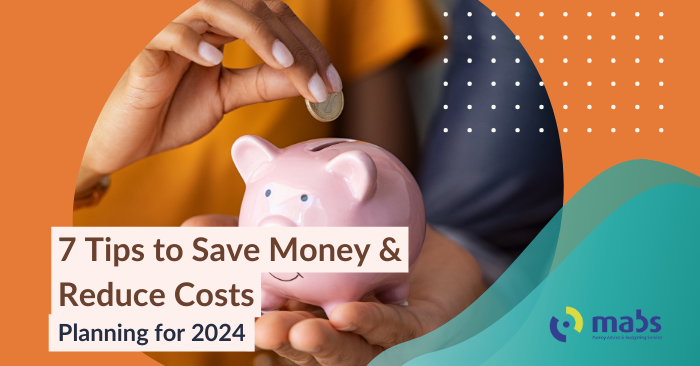7 Tips to Save Money & Reduce Costs

Another new year, another new year’s resolution. We tend to use the beginning of the year as an opportunity to set loads of goals. We might set one goal to be as financially ‘healthy’ as we can for the year ahead.
One of the best places to achieve positive financial health or wellbeing is to start with a budget. You can read our beginners guide to managing your money blog as a good starting point.
Once you set up a budget, you will be able to ask yourself such questions as:
- Can I increase my savings?
- Am I able to reduce my outgoings or what I’m spending?
- What certain costs or things can I cut?
We’ve pulled together 7 helpful tips to help you get started on answering those questions and how best to save money!
Let’s dive into our 7 tips…
1. Set mini saving goals
Setting mini saving goals can make the overall process much easier, and it can help reduce overwhelm. An example of a mini saving goal might be saving for occasions such as a birthday or special family event. Ask yourself how much you think you will need for this event and plan to achieve the goal.
2. Figure out where to put funds – Credit union/Bank/Post Office/Revolut Vaults etc
A handy tip is to put your money out of reach. By that, we mean to put your money into a separate saving account or create a digital ‘envelope’ such as money jars on offer from An Post. Remember that piggy bank that you had when you were younger? Well, there was a reason for having a place where you could place any extra pocket money. It put it out of sight and made it harder to spend.
3. Stay Strong and track progress!
Stick with it! Try, if all possible, to reduce temptation and keep to your plan. Track your progress by keeping a note on your phone or a note on the fridge door. It can help to keep you motivated towards your goal.
4. Avoid using credit to pay bills and never withdraw cash on a credit card
Credit cards can be one of the most expensive sources of money or credit. If at all possible, try not to use a credit card to pay bills or draw cash from an ATM. If you like to learn more about credit cards, then read our MABS investigates blog on credit cards.
5. Check Insurance policies / Memberships / Subscriptions – can you get better deals?
Shop around! Many utility providers offer incentives and savings to switch. However, it’s important to remember to only switch when your contract is expired. We have a blog series on switching your energy provider, your broadband, and your insurance.
6. Cut back or downgrade services (basic packages on SKY/Virgin)
Do you have the best value TV package? It might be time to review. With the increase of streaming services, it might come as a surprise when you sit down and review what you are spending on monthly subscriptions. Ask yourself if you are getting value and using them all? Can you take a break to make some short term savings?
7. Separate ‘Needs’ from’ Wants’ identify costs that you can start cutting down
One of the most challenging things to do is decide what we need and what we want. It can be a helpful exercise to review what we are spending and ask if it is something we really need or something that we want. If it’s a want, can you do without it for a while to help you achieve your short-term saving goal?
When?
There is no time like the present!
The beginning of the year is a great time to start as you can plan the expenses for the year. Putting small savings to one side monthly or weekly helps reduce the stress when you have a financial emergency.
Why?
There are many reasons why you should save! Some of the top reasons are…
- Emergency Fund
- Unforeseen expenses
- Living debt-free
- College Education, or
- Saving towards a financial goal.
How?
Start by learning to budget, which will allow you to understand your finances. One area which we discuss a lot with our clients is how to save on your utilities. Maybe you can save some money by comparing websites to check different rates? Useful websites for this are Bonkers or Compare.ie.
What are the day-to-day things you do? Maybe a food shop or packing the kid’s lunches for school? Think about using leftovers from dinner or lunches to re-use for the school lunches! This also helps to cut down on food waste. To find more information and ideas on how to reduce your food waste, check out Stop Food Waste.
Try a ‘No Temptation month’ or a ‘No spend week’. This may be a challenge, but it will allow you to see what you’re spending on the basic requirements and what you can cut out on a weekly or monthly basis. When doing this, you should take the time to review your bank statements – grab that highlighter – underline all those coffees and takeaways. They all add up!
About The Author
Josh Wentfort
Finance/IHCAE
Saving money is the same as saving life for me. The more you save money the more years you add to your life. Take a moment and read my article to learn more about saving.